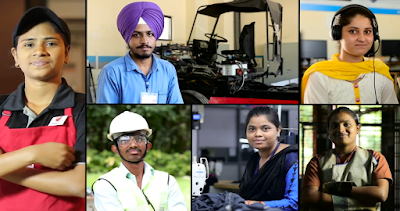An
ambitious eagle in her comment over the last post asked the monkey’s eye view
on self-help books and her opinion on people who read them. The monkey did some
clanking over the laptop (yeah, we have internet in the tree-tops – have you
ever wondered why the Wi-Fi symbol looks like a canopy? Ha!). After researching
why these bipedal featherless apes, my distant cousins (a.k.a. Homo Sapiens)
are reading self-help books, the monkey did come up with some observations.
Self-Help
Books- An Irony?
Usually
people write (including me) to convey their ideas to a larger public and so
would be people who write self-help books. It is quite relatable being in a
sense of loss of direction and all of us do look for someone to guide us. The
monkey’s doubt pops out then- how can a man in mid-forties, sitting in his
penthouse in Los Angeles be able to give his advice on how to lead a happy life
to a confused teenager in Chennai? The monkey thinks that reading self-help
books is an irony. As a matter of fact, reading a self-help book written by
someone who is not familiar to your context and situation could even prove
disastrous. Add to it, the oxymoronic situation where you want to help
yourself, but you are asking for someone unknown fellow to guide you through
things that s/he is remotely aware of. You know what, I don’t think even monkeys
will do that and hence why would humans do it? Thought worth pondering?
A
few hundred thousand years ago when the monkey’s ancestral aunt and her
contemporary human-lady could remember the face of their mutual friend, a
person among the humans came up with this advertisement – you want a land full
of sweet fruits and orchards? Pray to the fire that’s burning the whole of our wilderness!
The monkey’s ancestral aunt denied in a “hoo hoo” and the human lady said, “emm…
zure (earlier word for sure)” – the last time monkey went to some “civilised
world”, they still follow these rules for happiness in their own modified ways
and as per her human friends – this practice is called religion! Whoa!
The
monkey thinks self-help books are for people who are disillusioned (or
mis-illusioned, or plainly illusioned). They bring in a belief that if you do “x”
things in your life your “y” problems are going to be solved. They do not talk about
the letters “a” to “w” while they talk about “x” and “y” – the way people
generally think that the world is all sunshine and rainbow and forgets about
the dark clouds. The monkey believes that humans have an ability to
retrospectively look at their own lives and make course corrections if they
feel so and that made them on the top of the nature’s pyramid.
Thoughts
on people who read self-help books:
As
mentioned earlier, a large number of humans are looking forward to self-help
books as a silver bullet to all their problems. Well, what is human existence
if there were no problems? What will prompt you to live? Now, the monkey does
not have any grudge towards those reading these books, but only a sincere
request to them – think for a second : What did you find different in the last
self-help book you read other than something that would have popped in your
common sense? If you are a lazy-cozy person and wondered about how to make your
life better maybe the book would have suggested you to get up early and follow
a schedule in your life. Well, the vocabulary might have been different and
filled with verbose, but to the core it is mostly likely to have this message. Now,
how different is it from common sense? All the monkey is asking you to try is –
think, a power that most of the bipedal apes do not have.
P.S.:
1.
Have I read self-help books? Yes, two in fact – Stephen R. Covey’s “7 Habits of
Highly Effective People” – it was a gift from a very dear person and I did read
it; Mark Manson’s “The Subtle Art of Not Giving A F*ck” – it was a brilliant read
to be honest, or more of a self-reflection.
2.
I’m sure you wouldn’t agree to all those the monkey has conveyed. Please feel
free to post your opinions and suggestions in the comment box.





